 |
 |
| |
|
|
| |
|
|
| |
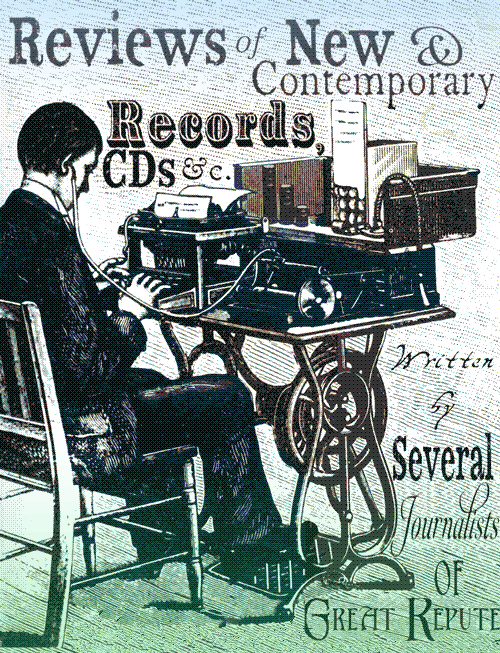 |
|
| =
April 2021 = |
|
|
| |
| Silver Stairs of
Ketchikan |
| Djinn |
| Jorge Elbrecht |
| Rostro Del Sol |
| Trace
Imprint |
| The Insektlife
Cycle |
| An Upside Down
Tree |
| Francisco
Mora Catlett |
| Katie
Spencer |
| Greanvine |
| United
Bible Studies |
| Sula
Bassana |
| |
| |
| |
| |
| |
| |
| |
| |
| |
|
|
 |
SILVER STAIRS OF KETCHIKAN
- EDEIDA
(Vinyl/CD/Digital from bandcamp.com)
Anyone taking inspiration from a work by Richard
Brautigan is bound to be blessed with a high degree
of discernment. And so it comes to pass. Named after
the late, great author’s poem, Silver Stairs of
Ketchikan is the long-standing if only occasionally
dusted-off solo venture of Bristol-based Charlie
Romijn. She will perhaps be better known to The
Reader for fronting Thought Forms and who, in both
her band and solo incarnations, graced our two Woolf
events (and in fact played a pivotal role in
organising the first of those).
Both lyrically and musically, EDEIDA has the
appearance of a defiantly bleak and personal take on
life, love and all who sail in her, flashing a
thoroughly satisfying two fingers (or middle finger
if you happen to be reading this west of The Pond)
to the idea that, post-lockdown, we must all join in
the happy-clap. Not here, no sir. Down with the
upbeat, this one’s for the gloomsters, and quite
beautiful shadows it casts, too.
The lead singles taken from the album serve as the
pair of opening moves, with ‘Old God’s Tongue’
sounding for all the world like a much more
interesting, doom laden take on Ultravox’s ‘Vienna’,
regular band mate Guy Metcalfe channelling the sort
of cavernous drum sound that John Bonham used to
beat out of The Grange’s corridors. The dense
gravitational thudding is offset by melodic keys,
which, again, mischievously echoes the
aforementioned Ure-rhythmics (or were they another
lot?). ‘Golden’ represents another reassuringly
desolate fumble through the murk, a dollop of dark
psychedelic folk as hauntingly beautiful as it is
unnerving. It’s hardly the type of sound for which
you require an algorithm to calculate your BPM’s,
yet unbelievably, ‘Passager’ manages to take things
down a notch or two; a dirge-like incantation with
ominous background accompaniment of the kind that
prefaces a murder in Midsomer, latterly fleshed out
with bass and some slappy drums. By contrast, ‘Child
Smile Eyes’ has more of a lilting melody, trading on
a repetitive, ascending guitar line which serves as
a languid to the point of can’t-be-arsed
instrumental mantra and with beguiling, vocals,
wordlessly cooing away deep down in the mix.
The closest concession to catchiness here is the
title track, a gorgeously refined serving of acid
folk. You could get lost in those woods and never
find your way out, not that you’d wish to. True to
form though, the pastoral idyll won’t last the
course, gathering pace and giving the impression of
being hunted by assailant unknown. ‘Pylon’ is
another alluring, swoon-some bumble through the
darkly delicious world of Meg Baird on downers,
while, built on a drone ‘Of Dried Grass; On The
Ground’ deploys mournful, layered harmonies that
sound like the Unthanks gathering together at
twilight to mediate on some family tragedy.
With new Thought Forms materials appearing as
infrequently as tax rebates, this one not just marks
time but, to its huge credit, succeeds in slaking
the thirst. So what if it’s relentlessly downbeat,
who honestly cares? I’m done with all that cosmetic
happiness, which, much like caffeine, gives you an
all too temporary buzz before you land nose first on
the flagstones of reality. This, on the other hand,
is substantial and deeply invigorating. Posties
won’t whistle it and you probably won’t name that
tune in one, but what it does have is that
deliciously special Hex Factor. All is well here in
Doomsterville.
(Ian Fraser) |
| |
|
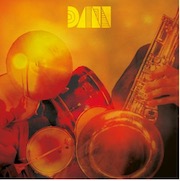
|
DJINN
– TRANSMISSION
(LP/DL from Rocket Recordings)
Hello, and welcome to Jazz Club...
Another variant strain of the Hills/Goat collective, Sweden’s Djinn trade
in a blend of globetrotting and cosmically
inclined jazz that, over eight succinct tracks,
performs a finely poised balancing act between
tasteful restraint and wild abandon. Melding the
soundtrack to Noggin the Nog with the moodier
recesses of the ECM catalogue, the spiritual
‘Sun Ooze’ provides the gentle introductory
offer, presaging the skipping ‘Creator’, with it
hints of Minami Deutsch’s ‘Tangled Yarns’. Here
the ululating sax and vocals provide topping for
a devotional post-Coltrane sound, the
exploratory skronking held fast to its mooring
by an unfussy, locked-in rhythm section. It’s a
more feral cousin of the scene that has also
found an unlikely home in the North West of
England - think Nat Birchall and Matthew Halsall
gone slightly off the rails.
There are distinct nods to Kosmische in its various forms with the title
tracks affecting Popul Vuh-style pastoral
classicism with it ethereal synth washes, while
‘Nights With Krupi’ is an imagining of how Can
might have sounded had they branched into World
Music (just waiting to be reminded that they
did, and that this sounded nothing like it).
‘Jaguar’ swaps ‘Krupi’s’ trilling flute
for tenor sax, the measured approach of the
first half becoming ever wilder as the finish
line looms into sight. For
much of the time ‘Urm The Mad’ appears anything
but - a gentle Balinese excursion until, like
‘Jaguar’ all hell breaks loose, tribal thumping
punctuating the sort of free-form blowing
that might have elicited a grunt of
approval from Albert Ayler. The delicately
atmospheric ‘Love Divine’ provides another of
those infrequent and indistinct vocal outings,
the flute once more to the fore before stumps,
courtesy of the exotically reflective ‘Orpheus’.
If only all “mindfulness” was like this.
There is a tendency with inspirational, expressive jazz workouts to
descend into extended jams, where the run out
grooves serve as escape lanes. Not so here,
where compositional discipline ensures a greater
breadth of listening experience and, ultimately,
more bang for your buck. Add to all that a
download of Djinn’s hitherto cassette-only
‘Avant de Servir’ EP release and this is a gimme
if ever there was .
...Grrrrreat
Ian
Fraser
|
|
|
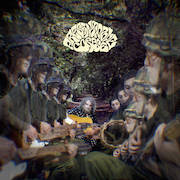
|
JORGE
ELBRECHT – PRESENTABLE CORPSE 002
(LP/Digital on bandcamp)
Jorge Elbrecht is a talented
multi-instrumentalist born in Costa Rica, and
currently bopping back and forth between there,
New York and LA.
He claims to be the victim of a more than
ten-year cognitive decline and mental splitting
into at least four distinct musical identities.
This malady has allegedly aged him by
three decades and left him wheelchair-bound, in
a shawl with scruffy hair and beard, supervised
by nurses. His
body of work is overseen by an Estate, whose
executor was kind enough to release this
wonderful album.
Whether eccentric persona, true life or
something else altogether, Elbrecht’s album is
fabulous sunshiny psych-pop from start to
finish. And
perhaps given his supposed split musical
personality syndrome, or maybe morbid sense of
humor, the melodies and tunes are all upbeat
sugary snacks, while the lyrics are a concept
album about a soldier in the Vietnam War,
brimming with darkness, pain, fear and loss.
If you listen to the album, you’ll get
that first part of what I wrote – about it being
full of upbeat pop psych.
But if you’re one of those listeners who
doesn’t listen closely to the lyrics on the
first pass, I’m guessing you’d never
pick up the second part about the Vietnam
soldier story unless you were forewarned, though
some of the song titles, like “Blocking Out the
Horror” and “Run & Hide” and the image of
soldiers playing instruments on the cover point
in that direction.
But to the album.
Elbrecht is a master songwriter,
musician, arranger and producer.
The album’s musical disposition can trace
its lineage to The Turtles, The Association, The
Byrds, or modern descendants like Triptides or
The Resonars. Elbrecht’s
greatest talent is as vocal arranger.
The songs herein contain incredible,
amazing, sensational harmonies – all by
Elbrecht. Those
harmonies, lush, full and emasculated with a
liberal dose of reverb, envelop you in a
comforting hug.
There’s something about the harmonies –
when you hear them on one song, they bring a
smile to your face, but when they keep going for
40 minutes, you’re in a state of prolonged
bliss.
Elbrecht has a strong cast of supporting
musicians such as drummer James Barone and
flautist Ben Donehower, but it is he who plays
most of the instruments.
While not listed, it appears to be a
varied assortment of guitars, bass, and
keyboards.
Highlights – all of them ultra-catchy
and would’ve been sure hits if we had a time
machine – include the bouncy “Tuesday Morning,”
jangle-and-harmony fest “Ancient Grief,” and
poignant string ballad “Brittle Vines Break”
(Elbrecht plays everything on this one).
“Run and Hide” is a 12-string
Rickenbacker ’66 Byrds meet Beach Boys cut that
is somehow simultaneously sweet and peppy with
dark undertones.
“The Springtime Brigade” is another
favorite – an indelible melody The Association
couldn’t have harmonized any better that turns
into a (somewhat) heavier rock song in the
denouement. But
really, every song is nearly letter perfect.
Presentable Corpse 002 is one of my
favorite records of this young year (and in case
you’re wondering, yes, there was a Presentable
Corpse 001 in his distant catalogue, but you
might have to ask the executor of his estate’s
permission to hear it).
In this release, Jorge Elbrecht shows
he’s as brilliant at composing, playing and
putting together a memorable, engaging tune as
they come. Check
it out now.
(Mark
Feingold)
|
|
|
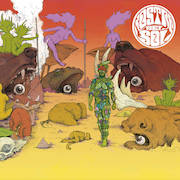
|
ROSTRO
DEL SOL – ROSTRO DEL SOL
(CD/Digital on LSDR
Records)
On Rostro del Sol’s debut album, they
join the storied history of great Mexican psych
bands, courtesy of Mexico’s LSDR – that’s Loud,
Slow and Distorted Riffs Records to you and me.
And what
a fabulous debut it is.
Rostro del Sol – literally “Face of the
Sun” - this heavy instrumental band veers from
genre to genre, often within the same song,
where it’s always 1968-1972 on the calendar.
They’re anchored mostly by the incendiary
guitar work of Mitch Balaant.
Balaant and his trusty axe will distort,
scream, gently weep and wah-wah your troubles
away.
On opener “Effect of Creation” a Jon
Lord-esque Hammond intro by Baruch Hernandez
gives way to a “21st Century Schizoid
Man” like horn section with Dan Samhain on sax,
then onto an ELP-meets-Yes prog showdown,
followed by a dizzying Mitch Balaant guitar
freakout extraordinare.
And that’s just in the first few minutes.
It keeps going(!) into a
Balaant-Hernandez funky guitar and organ break
reminiscent of early Santana.
The Santana and King Crimson vibes
continue as reprises throughout the album.
Allow me a brief interlude, as I’m
listening while I’m typing – DAAAAAAMN, that
Mitch Balaant can bloody play!
Sorry ‘bout that.
Almost pulled a muscle playing air
guitar. Now,
where were we? Ah,
yes, “Backyard’s Blues” opens with Balaant
playing some just sick, scorching guitar again.
This segues 90 degrees into some dirty,
funky, chunky Tex-Mex blues a la ZZ Top or
Stevie Ray Vaughn, before Balaant and Hernandez
switch back to the heavy stuff.
The rhythm section of Israel Mejía
on bass and drummer Demian Burgos bring their
strengths to the fore.
On “Bop C Sketches” we get a return to a
Santana vibe, mellow this time, but you just
know that won’t last too long, don’t you, and it
doesn’t. What
can I say? Mitch
Balaant grabs ahold of the song and it’s off to
the races again with some sizzling lead guitar,
leaping from there back to prog, then more of
that doggone acid rock.
The sections highlighting saxophone
player Dan Samhain, in addition to early King
Crimson, bring shades of Sendelica, Gong, and
Hot Rats-era Frank Zappa.
Another duel between Balaant and
Hernandez on guitar and Hammond and our brains
are splattered on the floor.
“Tales… I-III” starts out with Balaant
on acoustic guitar and looks to be the
obligatory token quiet piece, and, well, um,
sorry, no. Very
soon we’re back on the prog and jazz fusion
train, with some nice Mellotron, followed by
some face-melting guitar.
An Allman Brothers “In Memory of
Elizabeth Reed”-like section rides us out to the
finish.
Closer “Cynical Mind” was released a few
months earlier as a single.
It’s kind of their “Soul Sacrifice” or
“Moby Dick.” The
track’s musical themes touch many of the above
genres, mostly Crimson meets Allman Brothers,
bookending a drum solo by Demian Burgos.
Besides the touchstones mentioned above,
if you love Terrascope fave Icarus Peel’s Acid
Reign - and really who doesn’t? – you’ll take
heartily to these lads from south of the border.
Rostro del Sol is off swimmingly to a hot
start, and we can’t wait to hear more. Though
their influences are many and easy to
distinguish, in the end they’re their own band,
full of originality and purpose, surprises, and
that special spark.
Finally, we must doff our caps to Elena
Ibañez
for her imaginative cover art.
It would fit well in the trippy Netflix
series “The Midnight Gospel” and works perfectly
for this album.
(Mark
Feingold)
|
|
|
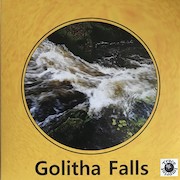 |
TRACE
IMPRINT – GOLITHA FALLS
Available on Limited edition vinyl LP from traceimprint.bandcamp.com
Trace Imprint is the musical project of West Country musician Jon
Chinn, who on this new LP plays all manner of
instruments, including guitars, keyboards,
electronics, fretless bass, xylophone, melodic,
gobichand, vocals and field recordings and he is
joined by Dan Gunning who plays drums, tabla,
djembe, shakers and hand claps. This LP is for
all intent and purposes an instrumental album
barring a little singing on ‘Gravity’.
Inspired by his Dartmoor surroundings and specifically by Golitha
Falls, a lovely part of the river Fowey which
glistens and glides through an area which is now
a national nature reserve where he regularly
walks his dog. The Full release available on
Bandcamp is of a multimedia project, which
includes a 30 minute film also entitled Golitha
Falls plus a download with spoken word by award
winning actress Maxine Peake who reads the
Edward Thomas poem The Bridge and Patrick Aston.
The album begins with a short piece entitled ‘Sweet Morning’ an
awakening alive with the sound of birdsong, then
we are into the album proper with ‘Interlude’
tabla and arcing fretless bass underpinned by
electronics weaves its way merrily downstream.
‘Procession To Succession’ follows, a
progressive ‘Sound Of Music’ motif is playfully
suggested and Jon’s fluid guitar work pours
itself across this quite lengthy track sounding
a little like an outtake from Fish Rising the
Steve Hillage album, which is quite apt really
as it also alludes to watery themes. ‘Canopy
Communication’ a short interlude is a little
unsettling, like the sun suddenly disappearing
behind a big cloud. ‘Systems Built On Boundaries
That Are No Longer Relevant’ suggest a gradual
return to nature, of structures being overgrown
with leafy tendrils. This first side ends with
the short ‘Jackdaws Circle At Dusk’ sounding
like a synthesised camping nightmare.
Side two unfurls with ‘As The Light Returns, We Radiate Colours’ as
gentle acoustic guitars, electronics and bass
swirl around joined by some terrific electric
slide guitar and twinkling percussion. It’s a
lengthy piece which wouldn’t be too out of place
on a Basho or Fahey album, albeit a much more
modern sounding one. Another lengthy piece
entitled ‘Gravity Is The Expression Of The Size
Of Creation’ follows this. As we drowsily amble
by the riverside I see more fish rising with
some fluid progressive electric guitar
movements, electronics and sympathetic drums.
The record ends with a short cosmic sigh called
‘Mother’. This is a really fine piece of work,
which I shall be returning to quite
regularly.
(Andrew
Young)
|
|
|
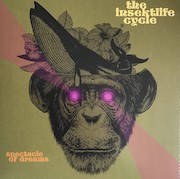 |
THE INSEKTLIFE
CYCLE – SPECTACLE OF DREAMS
LP
available from www.sugarbushrecords.com
This
is a compilation album of tracks appearing on
Vinyl for the first time from instrumental psych
rock band Insektlife Cycle. The is from the
Philippines, and they have so far put out a
couple of albums and singles, on labels such as
Mega Dodo, Fruits De Mer and El Ron Del Mundo.
The band is made up by members Ronaldo S. Vivo
Jr, Ronnel Vivo, Jay Jumawan and Joy Legason.
Opener
‘Unicycle Monologue’ sets out their stall with a
rifftastic, prog rock song which doesn’t do what
you expect it too, never quite taking off but
steadily motoring along. The following
‘Schizodelia’ takes off straight away, plenty of
spindly psychedelic lead guitar pursuing
heavenly spirals of glistening electric strings,
again it has a central riff which the band
return to throughout its duration, I am reminded
of the American group Ruby formed by Tom Fogerty
from Creedence Clearwater I believe, which
British people may know from the track BART
which was used by the BBC to accompany test
cards. The first side ends with ‘Dreams
Unrecalled’ an excellent, psychedelic
progressive rock song which the band cooks up a
storm to.
‘Sleep
Crawler’ which begins side two is particularly
good, heavenly electric guitars, a super tight
rhythm section, Ronnel and Jay’s guitars playing
is intuitive and fabulous throughout. ‘Forbidden
Earth Dance’ does that great thing of taking off
halfway through mutating into something entirely
different before returning to its central
melody. ‘Insekt Circus’ rocks like a bastard,
another prog rock song invested with a high dose
of psychedelia. The band are very intuitive and
seemingly feed off each other, driving the songs
along as one, much like a shoal of fish twisting
and turning as one. The album ends with the
brilliant ‘Tristful Ecstasy’. There are only 200
copies of this in existence and they won’t hang
around long, so do yourself a favour and get
one, it’s a terrific album.
(Andrew
Young)
|
|
|
 |
AN UPSIDE DOWN
TREE – SUNSHINE AT THE CAFE RIDARD
Self-released
vinyl LP available from https://anupsidedowntree.bandcamp.com
This
is the second album from Erik Moore and
Annabella Maneljuk, the first was under a
slightly different moniker being released as
Journey To The Upside Down Tree. For this outing
Annabella plays keyboards, melodic, glockenspiel
percussion and vocals and Erik handles the bass,
guitars, thumb piano keyboards, percussion,
Balafon and vocals and again just like last time
Mark Hill adds Korg MS20 and filtered radio
synthscapes with George Harris additional vocals
and Charlie Moore adding drums to a couple of
tracks. It was recorded at the Sydenham Opera
house studio in Crystal Palace.
The
first album was a very organic sounding album
which I enjoyed immensely and this has the same
well recorded sound with plenty of space for the
instruments, it sounds very good. Over a
twinkling percussive bed with deep expressive
bass, guitar and melodic, overlayed with synth
the opening song pootles along merrily, it’s
almost an instrumental start with just a vocal
sample employed a couple of times. A village
bell introduces the title track which follows;
again it’s rich in percussion and bass. They do
have a unique sound which I find hard to
describe, a sort of electronic acoustic dubby
folk kind of thing with plenty of space.
A filigree guitar bubbles away in
‘Travelling Alone In A World Full Of People’,
rich with African accents and lightly billowing
synth. The first side ends with ‘Something
Happened And Our World Disappeared’ and a full
drum kit is employed, a spoken word song with
plenty of bubbling synth.
Side
two continues with ‘The Perfect Plan’ a spoken
word narrative that adds a soft folksy singing
part by Annabella, and sparse injections of
guitar and melodic, it’s a spooky folk song.
This is followed by ‘Skipping Rope’ a spidery
tune with plenty of expressive bass guitar and
keyboards. ‘Jam At The End Of The World’ is the
other song to employ a full drum kit, a lazily
spun, deliciously dreamy narcoleptic tune.
‘I’m..... (Singing In The Bath)’ follows,
another spoken word song delivered in a slightly
bored world weary way by Erik as plenty of
percussion and expressive bass provide a musical
bed. The album ends with ‘Kiss That Warm Smile’
sung by Annabella, a charming song, soufflé
light with a start stop motion, again rich in
lightly dubby bass, piano spacey synth and
guitar.
(Andrew Young)
|
|
|
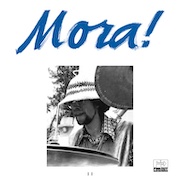
|
FRANCISCO
MORA CATLETT – MORA! I & II
(LP/CD/Digital on Far
Out
Recordings)
Mexican-American percussionist Francisco
Mora Catlett has re-released his ultra-rare 1987
LP Mora!, originally a private press release,
and the even rarer follow-up recorded in the
years after, but inexplicably shelved for
decades. He’d
released it in 2005 as a now nearly forgotten CD
called River Drum on a tiny label, but now both
albums finally receive a proper full release
with the treatment they so richly deserve.
Mora was born in Washington DC to a pair
of Mexican bohemian artist parents, and grew up
in Mexico City.
After spending time as a session musician
for Capitol Records in 1968, he went to the
Berklee College of Music in Boston, graduating
in 1973. Back
he went to Mexico City, where he started making
plans as a working musician and artist.
But fate had other plans in store from
him when Sun Ra and his Arkestra came to town to
perform, and ended up sweeping Mora away in the
Arkestra for the next seven years.
I’m sure he must have amazing stories to
tell about those heady days.
Space may be the place, but Detroit is
where Mora settled down, and recorded what would
be the ‘Mora! I’ album.
It's a joyful celebration of
Afro-Cuban-American percussion-heavy rhythmic
jazz, tying together many of the influences Mora
absorbed over the years throughout the New
World. The
expansive “Afro Jum” introduces many of the
themes Mora would re-visit again and again
throughout the two albums, each time with more
exuberance. The
festive “Rumba Morena” is one of the highlights
of ‘Mora! I.’ It’s
got Afro-Cuban written all over it, with lovely
vocals by Mora’s wife Teresa.
The percussion bursting from the Rumba is
frankly astonishing:
Mora on conga and tumba, and Teresa on
wooden rods developed in Cuba called claves;
then through overdubs, Mora on the bata drum and
a traditional drum kit; timbales, bells, more
congas and finally steel drums by Emilio Borde
to really put you in the mood.
Teresa’s alluring vocals appear again on
the misty “Five AM.”
It’s a muzzy Five AM at the end of an
enchanting evening (of course, it’s jazz!), not
the dawn of a new day.
Whistles usher in the conga line and
contagious joy of “Samba de Amor.”
It’s a marching party of a track, with
Teresa’s vocals and steel drums returning for
the carnival, a rumbling piano solo by Ken Cox,
of course loads of percussion, and even just a
tinge of library music.
The celebration will have you shaking and
shimmying around the living room.
However, it’s actually Mora! Part II,
the second, virtually unreleased album that’s
the true gem here.
By now, Mora had added South American
textures to the Afro-Cuban mix of his musical
worldscape. He
also padded the already strong ensemble, adding
a four-piece horn section starring ace trumpeter
Marcus Belgrave, and even a string quartet.
The striking results leap with
excitement. Mora
revisits many of the tracks in Mora! Part I,
such as Afra-Jum and Samba/Conga de Amor, but
this time everything is even punchier and
brighter, now re-written and rounded from top to
bottom with the stellar cast of players (twelve
of them not counting the string quartet).
One of the highlights of the newer
tracks on the second album is “Amazona,” which
actually squeezed out into the world and
received high praise in 2004, and even a remix
version by Carl Craig.
“Amazona” is all exuberance and
celebration, with all the best elements of the
album – the new horn section blasting away, a
swaying and bouncing percussion section, Ken
Cox’s sprightly piano, and Teresa Mora’s vocals
as the cherry on top, sassier and more assertive
than ever.
The bongolicous “El Moro” comes across
as almost Exotica, and almost everyone in the
huge ensemble contributes something to the sonic
palette.
With a title like “Old Man Joe,” you
might think it was a slow ballad about a
riverboat sung by a bass vocalist.
It’s anything but.
It’s another springy carnival
celebration, with all those horns chipping in
among the congas and timbales, based around an
infectious earworm melody (and to think, some
call Mora an avant-garde composer).
I can imagine it blasting from the
speakers of every beachside bar.
Another highlight, the re-done “Samba de
Amor,” now rechristened “Samba/Conga de Amor” is
an even more can’t-sit-still-shake-your-booty
fiesta, with the horn section aflame with great
solos by Marcus Belgrave on trumpet and Sherman
Mitchell on trombone.
I can’t for the life of me imagine why
anyone would want to shelve “Mora! II,” and for
decades at that.
It’s nothing less than an affirmation of
all that’s wonderful about music; it’ll get your
blood pumping and put a smile on your face.
Why, it’s almost a great workout just
listening to it.
We’re lucky to have both of these albums
finally released properly after all these years.
Salud!
(Mark
Feingold)
|
|
|
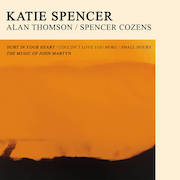
|
KATIE SPENCER - HURT IN
YOUR HEART
(CD from Bandcamp)
We
previously
stated that Katie Spencer was someone to watch,
and as if to prove it she has recently blessed
us with a lovely EP of John Martyn songs titled Hurt
In Your Heart. The heartbreaking title
track comes from Martyn’s sublime 1980 album Grace
and Danger, which chronicled the painful
collapse of John and Beverley's marriage.
Katie's voice has never sounded better and her
delivery really tugs on the heartstrings. Her
lovely version of "Couldn't Love You More" from
his 1977 album One World continues to
captivate the listener's emotions in a very
special way. Her stunning voice is so beautiful
that it nearly overshadows her gorgeous
finger-picked acoustic guitar playing, however
they simply pair so well and naturally that one
cannot help but become enchanted by it.
Perfectly rounding out this EP is "Small Hours",
also from One World. Truly a rare talent,
Katie becomes one with these songs. With no
disrespect to John Martyn's wonderful writing,
listening to this you would swear that Katie
wrote these words, her voice comes directly from
her heart. And who better to accompany Katie
here but none other than John's old bandmates
Alan Thomson and Spencer Cozens. Lastly, it
would be remiss of us not to acknowledge the
exceptional sound quality on these recordings.
An essential release -- do not hesitate to grab
this while you can.
(Kent
Whirlow)
|
|
|
 |
GREANVINE –
HANGED WITH GOLD SO RED
(CD-r
limited to 100 copies from www.greanvine.bandcamp.com
)
Greanvine
are a band formed by Steven Collins and Diana
Collier of the band The Owl Service. They
released a full length album and a three EP’s,
all of which were very limited releases and duly
sold out almost immediately (with some online
and some given away free at concerts) a few
years ago, shortly after their release. Steven
has now decided to press up another 100 of each
and they are now available again for anybody who
may have missed out the first time around.
Steven and Diana have also recorded a new CD EP
with a very wintery theme entitled ‘Hanged With
Gold So Red’. The
other three being made available again are ‘Witch
Songs’, ‘An
Angel Shone’ and full length album ‘Mark
You That & Noat You Wel’ (Sic).
Hanged
With Gold So Red starts with the traditional
‘Corpus Christie Carol’ written by Benjamin
Britten which leads nicely into a cover of
Broadcast’s ‘Winter Now’ sung softly and sweetly
by Diana whose words fall gently like snowflakes
over Steven’s minimal backing of electric
guitar, percussion and keyboards. ‘Christmas Is
Now Drawing Near At Hand’ another traditional
song which is beaytiful but too short at barely
two minutes. A song first heard on the debut
album by Movietone follows this called ‘Blank
Like Snow’ again very gentle with minimal
accompaniment. Another short traditional song
about feasting is next entitled ‘Herod & The
Cock’. John Cale’s Winter Song is given the
Greanvine treatment and sounds for all the world
like one of their songs, again lovely simple
musical accompaniment with arpeggio electric
guitar, xylophone and mellotron. This wintery EP
ends with a cover of Low’s ‘Taking Down The
Tree’.
It
is a perfect antidote to all those Christmas
albums that, well you know the ones! But this
one is as pure as the driven snow and tasteful
in the extreme.
(Andrew Young)
|
|
|
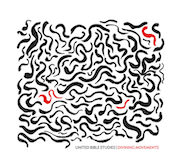 |
UNITED
BIBLE STUDIES – DIVINING
MOVEMENTS
(CD), WEST
KENNET
ASCENSION (Cassette) on Pariah
Child
Records
United
Bible Studies bring us two new releases which
follow on from 2019’s ‘Cave Hill Ascension’ to
complete the ‘Cave Hill’ trilogy. As might be
expected there are themes and moods that weave a
thread through all three releases whilst each on
their own maintains its singular freestanding
character.
‘Divining
Movements’
is divided into four movements on a double CD,
each movement timed at exactly 23 minutes.
For this recording, United Bible Studies
are a quartet consisting of Alison O’Donnell,
David Colohan and Dominic Cooper with Matt
Leivers playing saxophone. Slowly shifting,
spacious and elemental waves of sound swell,
float and fade away into silence. Richly
textured and expressive wordless vocals, brief
flurries of saxophone, subtle wisps and shimmers
of percussive colour and elegant, occasionally
dramatic layered drones create a spiritual,
meditative ambience and a lovely indulgent sense
of isolation and natural space. Occasional
touches of electronic dissonance, synthesized
textures and treated vocals are wisely used to
embellish and not detract from the immersive and
hypnotic ambience. Each of the four movements
maintains a core musical ambience and mood but
also creates its own personality. Frequent
reminders of Popol Vuh, Jon Hassell, Dead Can
Dance, monastic chant and the more
cathedral-esque and spacious ambiences of John
Surman and Jan Garbarek present themselves
throughout the four movements in the best
possible ways.
The
third and final part of the trilogy ‘West Kennet
Ascension’ is a cassette release boasting an
expanded line up where the aforementioned
quartet are joined by Diana Collier, Sophie
Cooper and Graeme Lockett. It was recorded in
several locations and is a more openly diverse
collection alternating quite starkly but
nevertheless effectively between short
unaccompanied songs sung in a stirring folk club
session style and lengthier, more exploratory
ambient pieces which hold a connection albeit
not always a direct lineage to other music
across the trilogy through the use of vocal
textures, expressive drones and saxophone.
Vocals either singular or choral are the
essential core here and are markedly more
prominent than the other trilogy recordings
creating moods and painting with sounds. On
‘Amongst The Illuminations’ organ drones and
desolate drums blend with wordless hymnal vocals
to create a ceremonial, sacred kosmische feel.
The title track concludes the tape and moves
elegantly from beautiful vocal soundscapes
through slowly building drones towards climax
where waves of voice, organ drone and sax swell
grandly before evaporating to nothing. There is
a sense that in addition to the expanded septet,
different recording locations such as West
Kennet Long Barrow and Waylands Smithy played a
big part in influencing the mood and sound.
These
are two very fine releases with their own
personality, quiet power and majesty rounding
off a trilogy that brings many rewards to the
attentive listener. There is an earthy and
sometimes unearthly grandeur in these recordings
that comes from their understanding of song form
and indeed long form and the use of the voice as
an individual and collective instrument is both
impressive and wonderfully expressive. These are
recordings to lose yourself in and let your
imagination fly.
(Francis Comyn)
|
|
|
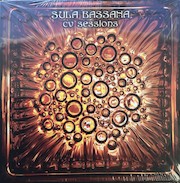 |
SULA BASSANA – CV
SESSIONS
(CD
from www.sulabassana.bandcamp.com
)
There
will be quite a few albums coming out this year
which specifically deal with the current
Coronavirus epidemic. Lockdown time will have
been used by plenty of musicians to dig out old
half finished bits of music. Some will use the
period to write new albums populated with songs
about these strange times and others will get it
together in their home studios to record new
music. Label owner and Electric Moon guitarists
Dave Schmidt has chosen to write and record a
solo album with instruments which he had at
home. Using a small analogue synth, drum
machines, sequencers, a string ensemble, a
polyphonic synth, Casio SK 1 and SK 60,
Stylophone, guitars, bass, mellotron and
whatever else he could get a sound out of. This
was recorded in Dave’s bedroom which is quite
unlike any bedroom I have ever slept in.
The
album is best taken as a whole at one sitting
really, it will also be made available as a
vinyl edition later on this summer by Norwegian
record label Pancromatic in a limited edition of
400 copies, this edition of CD’s is also limited
to only 500 copies. The album is a lot more
electronic in style with a distinct Krautrock
feel, steady motorik beats with plenty of
billowing synths. Opener ‘A Nice Constellation
Of The Planets’ sounds for like a pocket sized
version of some of Hawkwind’s more synth
dominated songs. ‘Wollschweber’ slows things
down with some nice lead guitar playing shot
through with clouds of misty mellotron. The meat
of the album is delivered via the 20 minutes
plus of ‘Ruins Of Civilisation’, slow to get
going but totally immersive and dreamy, it is
sequenced well with the shorter songs such as
the chugging fug of ‘Foggy Forest’ and the
brilliant, drifty soundscapes of ‘What Is
Reality’, framing the lengthier workouts, both
being well over the ten minute mark, such as
‘They Have Landed And They Come In Colours’ a
huge monolithic slab of electronics and ‘Der
Traurige Essigfisch’, which is dreamy and lush.
(Andrew Young)
|
|
|
|
|
|
|
|
|
|
 |
|

